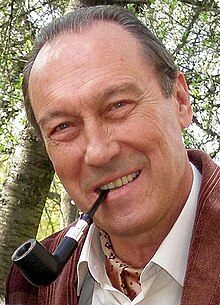Oleg Yankovsky
| Oleg Yankovsky | |
|---|---|

Oleg Yankovsky, May 2007
|
|
| Born |
Oleg Ivanovich Yankovsky 23 February 1944 Jezkazgan, Kazakh SSR, USSR |
| Died | 20 May 2009 (aged 65) Moscow, Russia |
| Occupation | Actor |
| Years active | 1965–2009 |
| Title | People's Artist of the USSR (1991) |
| Spouse(s) | Lyudmila Zorina (1941) |
| Awards |
|
Oleg Ivanovich Yankovsky (Russian: Оле́г Ива́нович Янко́вский; February 23, 1944 – May 20, 2009) was a Soviet/Russian actor who has excelled in psychologically sophisticated roles of modern intellectuals. In 1991, he became, together with Alla Pugacheva, the last person to be named a People's Artist of the USSR.
Born into a noble family of Russian, Belarusian and Polish stock, son of Life-Guards Semenovsky regiment's Stabskapitän, Oleg Yankovsky formed an ambition to emulate his brother Rostislav and joined the Saratov Drama Theatre in 1965. His film career was launched two years later, when he was cast in two movies about World War II, namely The Shield and the Sword (Shchit i mech) (1968) by director Vladimir Basov and Two Comrades Were Serving (Sluzhili dva tovarishcha) (1968) by Yevgeni Karelov.
During his remarkably prolific screen career, Yankovsky appeared in many film adaptations of Russian classics, notably My Sweet and Tender Beast (1977) and The Kreutzer Sonata (1987). A leading actor of Mark Zakharov's Lenkom Theatre since 1975, he starred in the TV versions of the theatre's productions, An Ordinary Miracle (1978) and The Very Same Munchhausen (1979) being the most notable. For his role in Roman Balayan's Flights in Dreams and Reality (1984) Yankovsky was awarded the USSR State Prize. He has been better known abroad for his parts in Tarkovsky's movies The Mirror (as the father) and Nostalghia (in the main role).
...
Wikipedia
